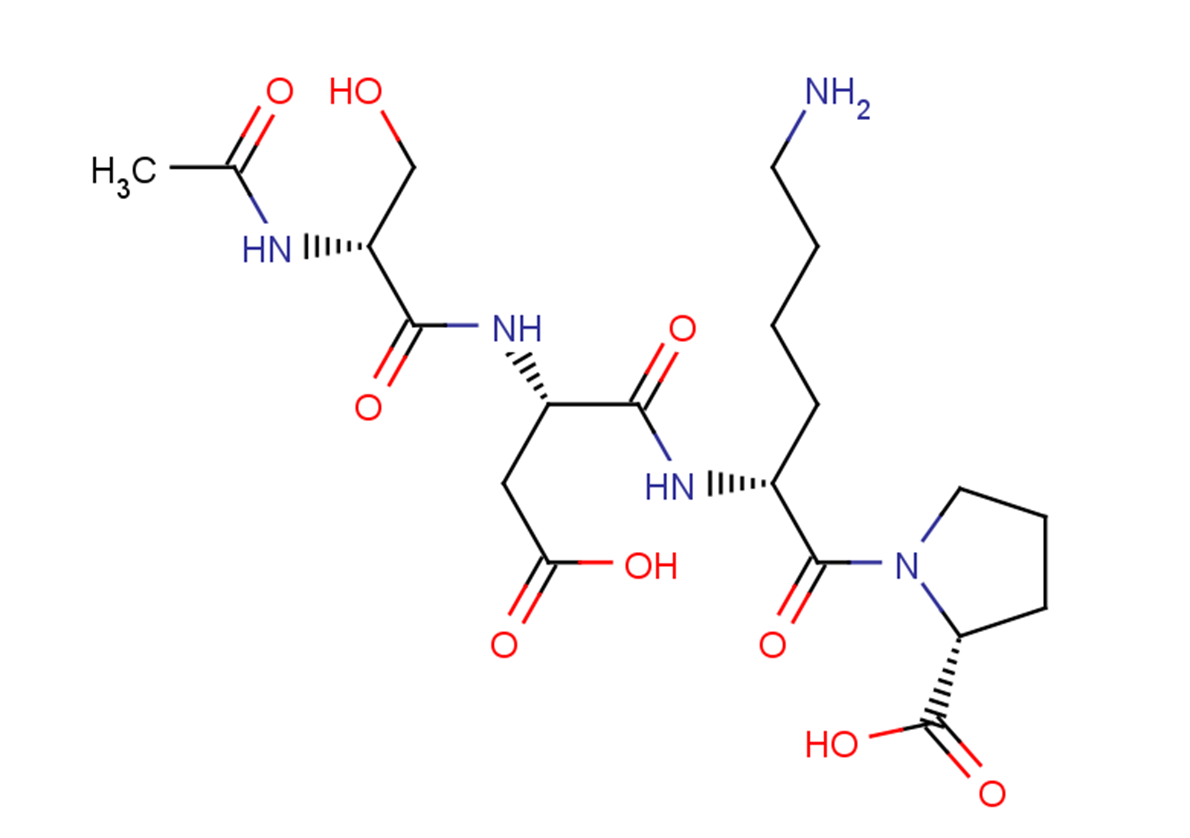
N-Acetyl-Ser-Asp-Lys-Pro
CAS No. 127103-11-1
N-Acetyl-Ser-Asp-Lys-Pro( —— )
Catalog No. M22966 CAS No. 127103-11-1
Acetyl Ser-Asp-Lys-Pro is formed in bone marrow cells by enzymatic processing of thymosin β4. It inhibits the entry of pluripotent hemopoietic stem cells into S-phase of the cell cycle and protects against Ara-C lethality in mice.N-Acetyl-Ser-Asp-Lys-Pro (AcSDKP) is a specific substrate for the N-terminal site of ACE and increases 5-fold during ACE inhibitor therapy. AcSDKP inhibited the proliferation of isolated cardiac fibroblasts (P<0.05) but significantly stimulated the proliferation of vascular smooth muscle cells.
Purity : >98% (HPLC)
 COA
COA
 Datasheet
Datasheet
 HNMR
HNMR
 HPLC
HPLC
 MSDS
MSDS
 Handing Instructions
Handing Instructions
| Size | Price / USD | Stock | Quantity |
| 5MG | 91 | In Stock |


|
| 10MG | 156 | In Stock |


|
| 25MG | 321 | In Stock |


|
| 50MG | 482 | In Stock |


|
| 100MG | 696 | In Stock |


|
| 200MG | Get Quote | In Stock |


|
| 500MG | Get Quote | In Stock |


|
| 1G | Get Quote | In Stock |


|
Biological Information
-
Product NameN-Acetyl-Ser-Asp-Lys-Pro
-
NoteResearch use only, not for human use.
-
Brief DescriptionAcetyl Ser-Asp-Lys-Pro is formed in bone marrow cells by enzymatic processing of thymosin β4. It inhibits the entry of pluripotent hemopoietic stem cells into S-phase of the cell cycle and protects against Ara-C lethality in mice.N-Acetyl-Ser-Asp-Lys-Pro (AcSDKP) is a specific substrate for the N-terminal site of ACE and increases 5-fold during ACE inhibitor therapy. AcSDKP inhibited the proliferation of isolated cardiac fibroblasts (P<0.05) but significantly stimulated the proliferation of vascular smooth muscle cells.
-
DescriptionAcetyl Ser-Asp-Lys-Pro is formed in bone marrow cells by enzymatic processing of thymosin β4. It inhibits the entry of pluripotent hemopoietic stem cells into S-phase of the cell cycle and protects against Ara-C lethality in mice.N-Acetyl-Ser-Asp-Lys-Pro (AcSDKP) is a specific substrate for the N-terminal site of ACE and increases 5-fold during ACE inhibitor therapy. AcSDKP inhibited the proliferation of isolated cardiac fibroblasts (P<0.05) but significantly stimulated the proliferation of vascular smooth muscle cells. Flow cytometry of rat cardiac fibroblasts treated with AcSDKP showed significant inhibition of the progression of cells from G0/G1 phase to S phase of the cell cycle. In cardiac fibroblasts transfected with a Smad-sensitive luciferase reporter construct, AcSDKP decreased luciferase activity by 55+/-9.7% (P=0.01). Moreover, phosphorylation and nuclear translocation of Smad2 was decreased in cardiac fibroblasts treated with AcSDKP. To conclude, AcSDKP inhibits the growth of cardiac fibroblasts and also inhibits TGFbeta1-stimulated phosphorylation of Smad2. Because AcSDKP increases substantially during ACE inhibitor therapy, this suggests a novel pathway independent of angiotensin II, by which ACE inhibitors can inhibit cardiac fibrosis.
-
In VitroN-Acetyl-Ser-Asp-Lys-Pro is degraded specifically by ACE, and its plasma level rises substantially during ACE inhibitor therapy. Flow cytometry of rat cardiac fibroblasts treated with N-Acetyl-Ser-Asp-Lys-Pro shows significant inhibition of the progression of cells from G0/G1 phase to S phase of the cell cycle. Moreover, phosphorylation and nuclear translocation of Smad2 is decreased in cardiac fibroblasts treated with N-Acetyl-Ser-Asp-Lys-Pro. N-acetyl-seryl-aspartyl-lysyl-proline appears to exert this function by blocking the action of a stem cell-specific proliferation stimulator and acts selectively on quiescent progenitors. N-Acetyl-Ser-Asp-Lys-Pro inhibits collagenase expression and activation is associated with increased expression of TIMP-1 and TIMP-2. N-Acetyl-Ser-Asp-Lys-Pro normalizes the IL-1β-mediated increase in MMP-2 and MMP-9 activities and MMP-13 expression.
-
In VivoN-Acetyl-Ser-Asp-Lys-Pro prevents hypertension-induced inflammatory cell infiltration, collagen deposition, nephrin downregulation and albuminuria, which could lead to renoprotection in hypertensive mice.
-
Synonyms——
-
PathwayEndocrinology/Hormones
-
TargetRAAS
-
RecptorACE
-
Research Area——
-
Indication——
Chemical Information
-
CAS Number127103-11-1
-
Formula Weight487.5
-
Molecular FormulaC20H33N5O9
-
Purity>98% (HPLC)
-
Solubility——
-
SMILESO=C([C@@H]1N(C([C@H](NC([C@@H](NC([C@H](NC(C)=O)CO)=O)CC(O)=O)=O)CCCCN)=O)CCC1)O
-
Chemical Name——
Shipping & Storage Information
-
Storage(-20℃)
-
ShippingWith Ice Pack
-
Stability≥ 2 years
Reference
1. Rousseau A, et al. The hemoregulatory peptide N-acetyl-Ser-Asp-Lys-Pro is a natural and specificsubstrate of the N-terminal active site of human angiotensin-converting enzyme. J Biol Chem. 1995 Feb 24;270(8):3656-61.
molnova catalog



related products
-
OPHIOPOGONIN D
Ophiopogonin D is a natural productand is a CYP2J3 inducer that significantly inhibits Ang II induced NF-κB nuclear translocation.
-
YS-49
YS-49 is an activator of PI3K/Akt (a downstream target of RhoA).
-
Fimasartan
Fimasartan(BR-A-657) is a non-peptide angiotensin II receptor antagonist used for the treatment of hypertension and heart failure.



 Cart
Cart
 sales@molnova.com
sales@molnova.com


